Harvest Concert
All Saints Church, Raheny
28 September 2012
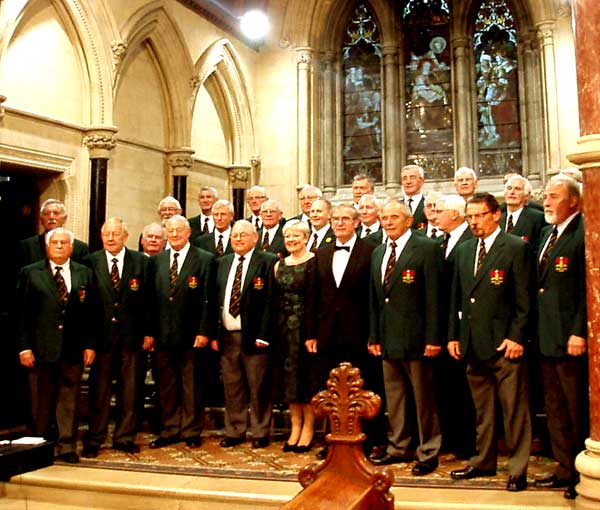
The Harvest Concert, was held in All Saints Church, Raheny, Dublin 5, in aid of the Church Roof Fund. Over 80% of the required funding has been raised by the (Church of Ireland) parish largely through a wide variety of events, ranging from Bible Readings, through Car Boot Sales, to major concerts, such as the Harvest Concert.
The principal performers were the Canton Male Voice Choir from Cardiff in Wales. They performed sixteen items in the course of the evening and they were ably abetted by members and former members of the local Church Choir. The Canton choir specialises in raising funds for good causes. It charges for performing at weddings and the like and this finances its charitable activities. Not only does it then sing for free but it makes a donation to the charitable cause involved.
This combines a fine Welsh tradition of community solidarity with a strong choral tradition which had its origins in various aspects of community life from the coal and steel mines of Wales to the church itself. The church in Wales has been a major force in preserving the Welsh language over almost four centuries starting with the William Morgan translation of the Bible.
It was fitting, then, that this choir came to perform in aid of the church roof fund. Much of the repertoire was in Welsh, mainly hymns, but there was a leavening of opera, dixie, and even a medley from the hits of the King himself, Elvis.
With a finely honed sensitivity to its audience, the choir started off the evening with Amhr�n na bhFiann and finished with Hen Wlad fy Nhadau, with the audience participating enthusiastically in both anthems.
The principal performers were the Canton Male Voice Choir from Cardiff in Wales. They performed sixteen items in the course of the evening and they were ably abetted by members and former members of the local Church Choir. The Canton choir specialises in raising funds for good causes. It charges for performing at weddings and the like and this finances its charitable activities. Not only does it then sing for free but it makes a donation to the charitable cause involved.
This combines a fine Welsh tradition of community solidarity with a strong choral tradition which had its origins in various aspects of community life from the coal and steel mines of Wales to the church itself. The church in Wales has been a major force in preserving the Welsh language over almost four centuries starting with the William Morgan translation of the Bible.
It was fitting, then, that this choir came to perform in aid of the church roof fund. Much of the repertoire was in Welsh, mainly hymns, but there was a leavening of opera, dixie, and even a medley from the hits of the King himself, Elvis.
With a finely honed sensitivity to its audience, the choir started off the evening with Amhr�n na bhFiann and finished with Hen Wlad fy Nhadau, with the audience participating enthusiastically in both anthems.
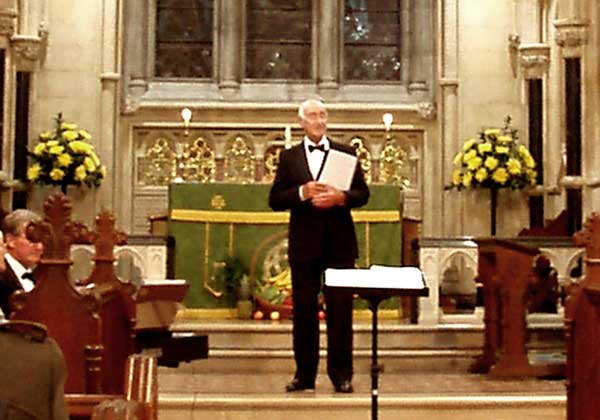
Raheny church choir member, Stanley, kicked off the night in great style. What else would you expect from a man who took all that trouble with his attire. Mind you, he does good stand up in the course of it. The choir were then given a rousing welcome and it was straight down to business.
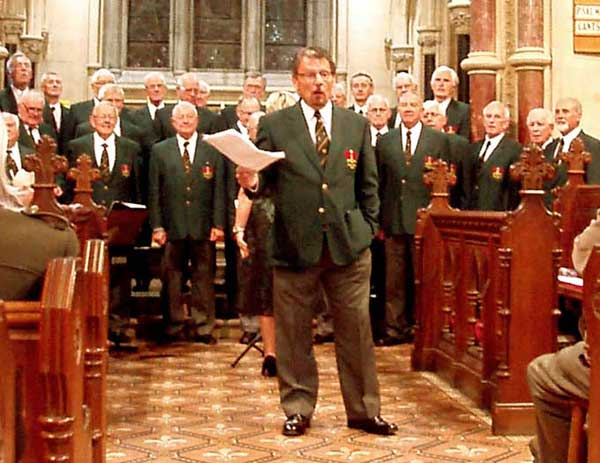
The choir's own MC who introduced their items, also teased the audience and even told a story involving the choir's musical director, a local Welsh hairdresser and the Pope. Brave man on all fronts.
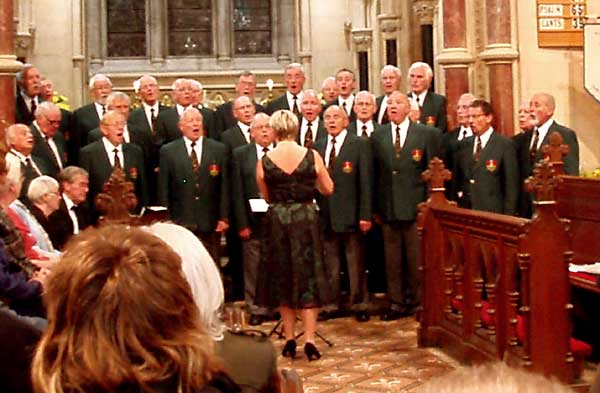
The choir's musical director, Monica Roblin, has honed the choir over the last twenty years into a very sweet sound. The contrast between the loud and soft passages was very effective and you had all the while the sense of a very controlled performance. Some of the arrangements were Monica's own and you could sense that competitive edge born of competing on the Welsh circuit and beyond.
The choir sang with great control and gusto. My own personal favourites are the Welsh hymns where the mood varies between reverence, power and the sheer joy of it.
Mind you, the tenors sounded a wee bit stretched by the end of the night. But that is understandable. For some reason, the tenor section in Welsh male-voice choirs is the hardest to fill. When I joined the Dublin Welsh male-voice choir around 1970 I was shoved staight into the top tenors, and it took me a few years to work my way down to my natural range which is/was baritone.
The choir sang with great control and gusto. My own personal favourites are the Welsh hymns where the mood varies between reverence, power and the sheer joy of it.
Mind you, the tenors sounded a wee bit stretched by the end of the night. But that is understandable. For some reason, the tenor section in Welsh male-voice choirs is the hardest to fill. When I joined the Dublin Welsh male-voice choir around 1970 I was shoved staight into the top tenors, and it took me a few years to work my way down to my natural range which is/was baritone.
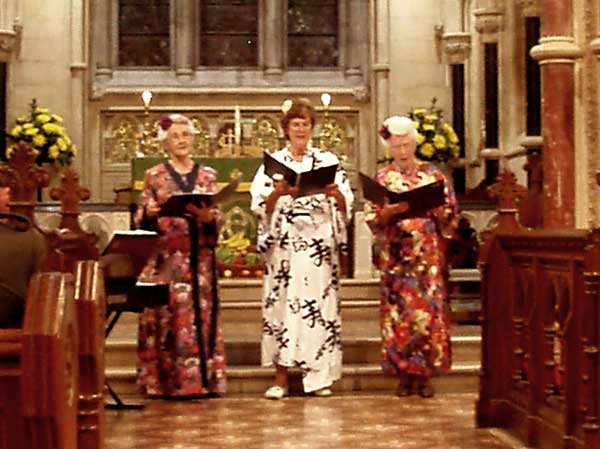
At the local end, we had Three Little Maids from School, charmingly sung by three ladies who had seen the back of school some while ago.
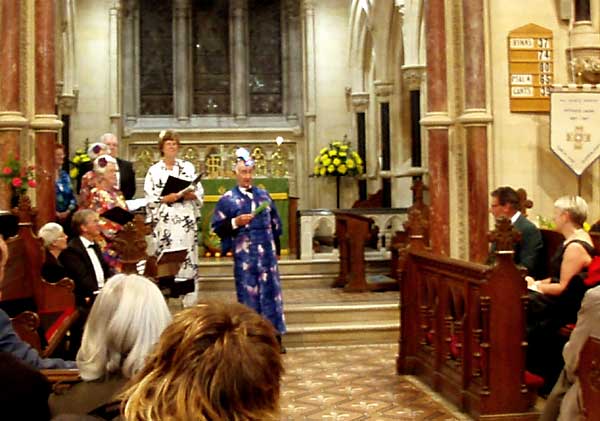
Stanley had us in stitches with A More Humane Mikado and a fan that seemed intent on parting company with itself at regular intervals.
Handel's Largo was sung in an appropriately ecclesiastical manner followed by a nice rendering of Purcell's Tune in D and the Dambusters March on the fine organ donated to the church by Lady Ardilaun in 1919.
Handel's Largo was sung in an appropriately ecclesiastical manner followed by a nice rendering of Purcell's Tune in D and the Dambusters March on the fine organ donated to the church by Lady Ardilaun in 1919.
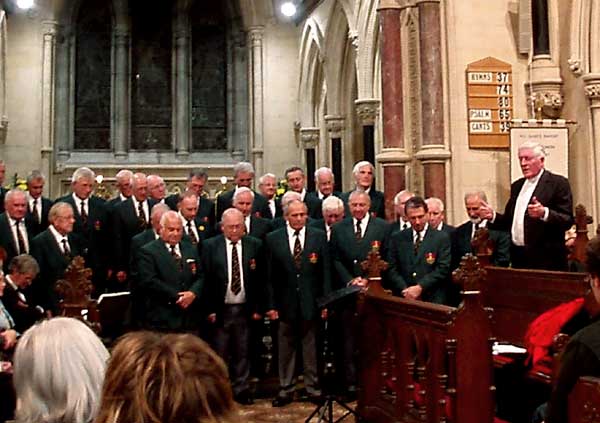
Towards the end of the evening, Reverend Jim asked the audience to take a few minutes silence to meditate on the modern significance of the Harvest Festival.
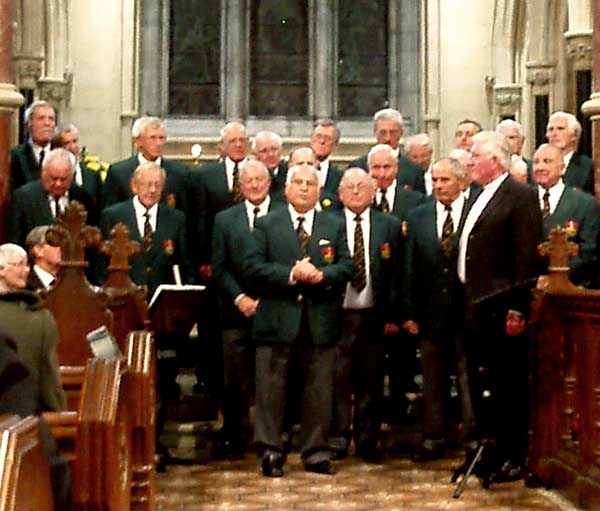
Eirian Owens, the choir's Chairman, explained how the choir operates and presented a cheque to Revernd Jim to add to the nights takings.
Eirian was a friend of the late Dic Jones, poet, farmer and briefly Archdruid. Dic was one of the main exponents of the strict metre in Welsh poetry but he also had a wicked sense of humour and wrote outrageous englynion digri (along the lines of our Limericks but in very strict metre).
It was appropriate that Eirian was speaking at this Harvest Concert. Dic Jones's most famous poem, which won him the Bardic Chair at the 1966 Eisteddfod in Aberafan, was Cynhaeaf (Harvest).
Eirian was a friend of the late Dic Jones, poet, farmer and briefly Archdruid. Dic was one of the main exponents of the strict metre in Welsh poetry but he also had a wicked sense of humour and wrote outrageous englynion digri (along the lines of our Limericks but in very strict metre).
It was appropriate that Eirian was speaking at this Harvest Concert. Dic Jones's most famous poem, which won him the Bardic Chair at the 1966 Eisteddfod in Aberafan, was Cynhaeaf (Harvest).
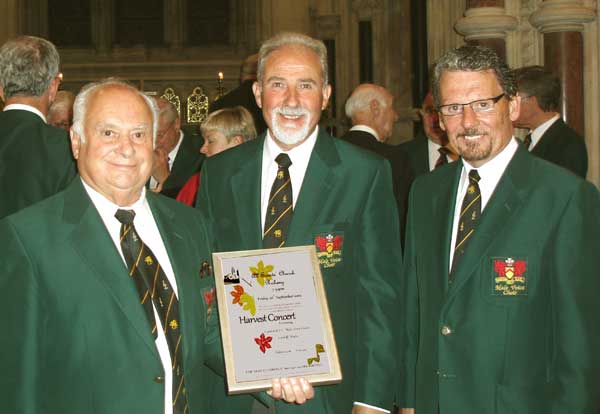
The choir was presented with a momento of their visit, seen here in the proud company of their Chairman, Secretary and MC.
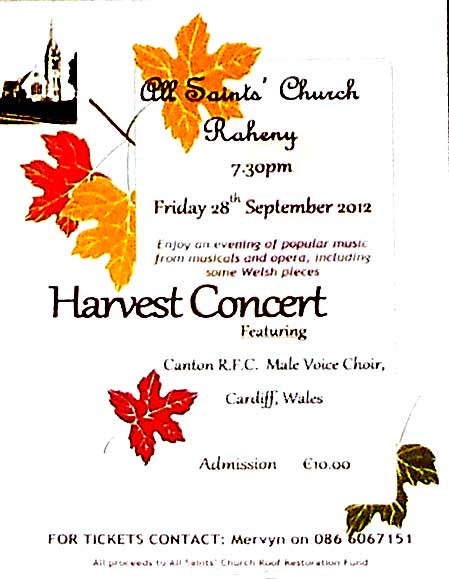
Nothing less than top billing for these lads and a trophy to take back to Canton to dazzle the home fans.
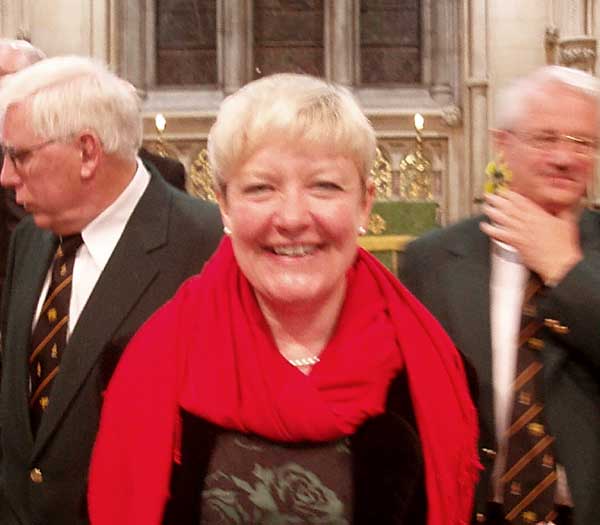
And Mistress Monica clearly ended the evening a happy lady. It was she who moulded some ex-rugby players into the initial choir and she has spent the last twenty years tending this delicate flower. The MC referred to her as "she who must be obeyed". Right order and the signs are on the performance.
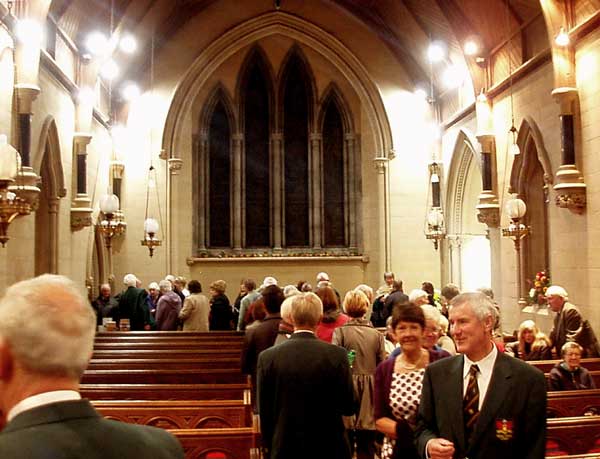
All good things come to an end. And so we all went home, secure in the knowledge that Baby Jesus would have a roof over his head again this Christmas.